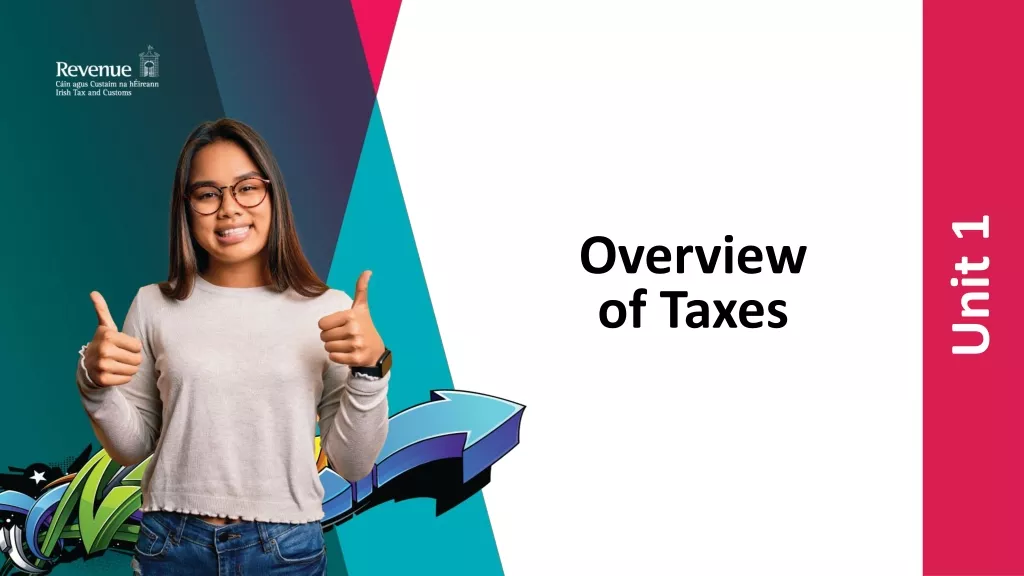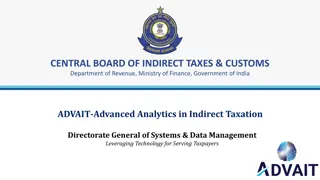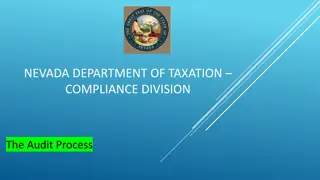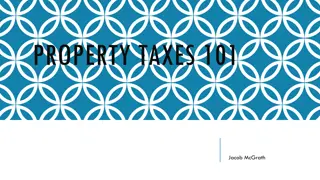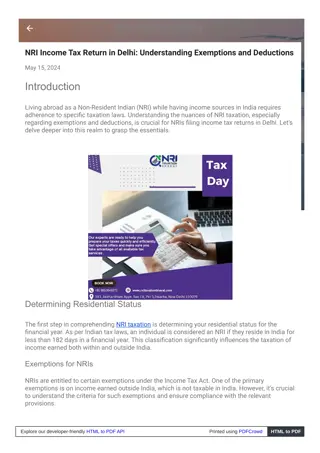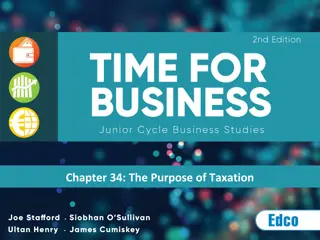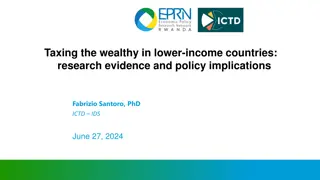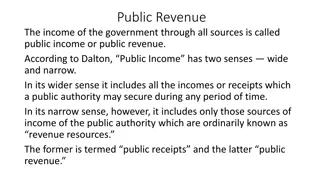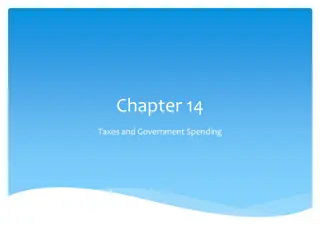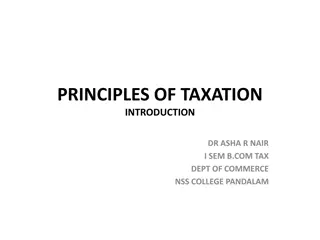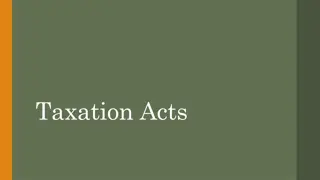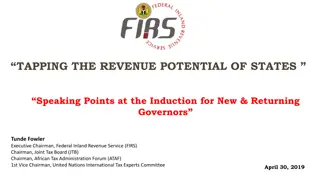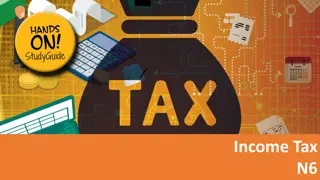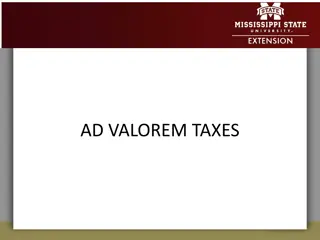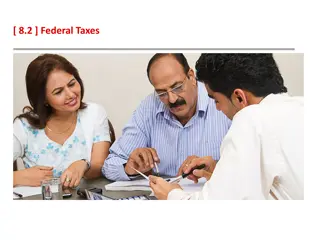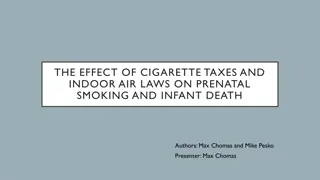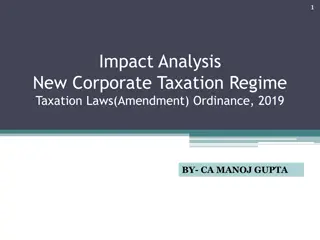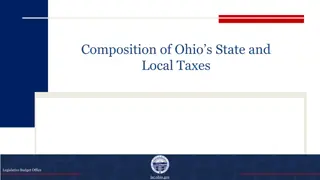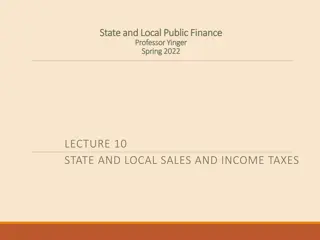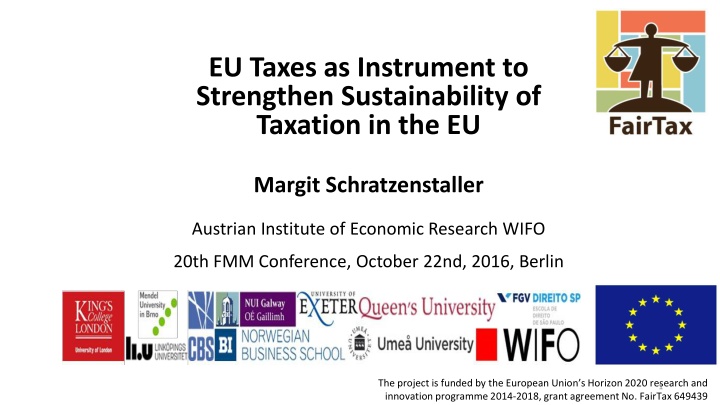
EU Taxes as Instrument to Strengthen Sustainability of Taxation in the EU
This project, funded by the European Union's Horizon 2020 programme, aims to explore options for harmonising tax policies in the EU, creating fairer tax regimes, enhancing tax administration effectiveness, and recommending true EU own-source revenues.
Download Presentation

Please find below an Image/Link to download the presentation.
The content on the website is provided AS IS for your information and personal use only. It may not be sold, licensed, or shared on other websites without obtaining consent from the author. If you encounter any issues during the download, it is possible that the publisher has removed the file from their server.
You are allowed to download the files provided on this website for personal or commercial use, subject to the condition that they are used lawfully. All files are the property of their respective owners.
The content on the website is provided AS IS for your information and personal use only. It may not be sold, licensed, or shared on other websites without obtaining consent from the author.
E N D
Presentation Transcript
EU Taxes as Instrument to Strengthen Sustainability of Taxation in the EU Margit Schratzenstaller Austrian Institute of Economic Research WIFO 20th FMM Conference, October 22nd, 2016, Berlin The project is funded by the European Union s Horizon 2020 research and innovation programme 2014-2018, grant agreement No. FairTax 649439 1
The project in brief Project facts Akronym: FairTax Duration: 4 years, from 2015-2019 Partners: 11 Coordinator: Prof. sa Gunnarsson, Ume University, Sweden In line with long-term EU strategies and challenges: EU2020 strategy; renewed EU Sustainable Development Strategy; Sustainable Development Goals; Paris Agreement H2020-Societal Challenges (EURO-SOCIETY-2014. OVERCOMING THE CRISIS: NEW IDEAS, STRATEGIES AND GOVERNANCE STRUCTURES FOR EUROPE) The Fair Tax project is funded by the European Union s Horizon 2020 research and innovation programme 2014-2018, grant agreement No FairTax 649439 2
Objectives Options for expanding EU legislative competences, or other governance mechanisms, enabling the EU to effectively harmonise and coordinate Member States' tax and social policies. Reform options for state-level coordination to create fairer, more stable and sustainable tax and social policy regimes. Strategies for the increased effectiveness and harmonisation of tax administration and compliance structures within the EU and non-EU areas. Recommendations for true own-source EU revenues. The Fair Tax project is funded by the European Union s Horizon 2020 research and innovation programme 2014-2018, grant agreement No FairTax 649439 3 .
FairTax work packages and research topics 1. Critical Assessment of EC Jurisdiction over Tax Policy Norms: Aspirations,Obligations, and Barriers Harmonising EU Tax Bases, Tax Rates, and Tax Mixes: Growth, Fairness, and Sustainability Gender Equality, Income Inequalities, and Coordinating the Individualisation of Tax-Benefit Unit Laws in EU Fiscal Policy European Pension Policies and Intergenerational Fiscal Sustainability, Fairness, and Consolidation Increasing Sustainability and Competitiveness by Harmonising and Coordinating EU Corporate Tax Bases Co-producing Tax Compliance: Tax Agency Mobilisation of Taxpayers, Businesses, and Third Parties (Nordic Countries) Tax Risk Management and Large Businesses: Cooperative Compliance Initiatives and the Role of Tax Advisors in Corporate Tax Policy and Practice (UK/Ireland and the Nordic Countries) Sustainability-oriented Options for EU Own Resources 2. 3. 4. 5. 6. 7. The Fair Tax project is funded by the European Union s Horizon 2020 research and innovation programme 2014-2018, grant agreement No FairTax 649439 8. 4
FairTax partners 1. 2. 3. 4. 5. 6. 7. 8. 9. 10. Kathleen Lahey, Queen s University at Kingston Canada 11. Leonel Cesarino Pess a, Getulio Vargas Foundation Law School Brazil (Coordinator) sa Gunnarsson, Ume University Sweden Lotta Bj rklund Larsen, Link ping University Sweden Benedicte Br gger, Handelsh yskolen BI Norway Karen Boll, Copenhagen Business School Denmark Ann Mumford, King s College London UK Lynne Oates, University of Exeter UK Emer Mulligan, National University of Ireland, Galway Ireland Margit Schratzenstaller, WIFO Austria Dana Nerudov , Mendel University Czech Republic The Fair Tax project is funded by the European Union s Horizon 2020 research and innovation programme 2014-2018, grant agreement No FairTax 649439 5
WP 8: Sustainability-oriented future EU funding 1. EU current system of own resources: historical development and criticism 2. Identification of fundamental pros and cons of tax- based own resources as an alternative own resource 3. Widening the perspective by innovative comprehensive concept of sustainability-oriented taxation 4. Establishing evaluation criteria capturing the four dimensions of sustainability relevant for taxation 5. Development and analysis/evaluation of candidates for sustainability-oriented tax based own resources The Fair Tax project is funded by the European Union s Horizon 2020 research and innovation programme 2014-2018, grant agreement No FairTax 649439 6
Rationale for sustainability- oriented tax-based own resources 1. Current system of EU own resources does not contribute to central EU objectives: smart, sustainable, inclusive growth according to Europe 2020 strategy; SDG 2. Sustainability-oriented tax-based own resources may reduce/ compensate for sustainability gaps in EU Member States tax regimes The Fair Tax project is funded by the European Union s Horizon 2020 research and innovation programme 2014-2018, grant agreement No FairTax 649439 7
Sustainability gaps in taxation in EU 1. average 50% on overall tax revenues in EU15 (EU28) High and increasing weight of labour taxes 2. increasing weight of VAT means increasing regressive distributional effects redistributive power of taxation has weakened Decreasing progressivity of tax systems 3. primary objective of environmental taxes is generation of additional revenues taxes on financial sector play limited role Decreasing importance of Pigovian taxes 4. Decrease of nominal corporate tax rate from 35% in 1995 to 23% in 2015 EU average accompanied by profit shiftingcorporate income tax losses EUR 50-70 bn. in EU Intense tax competition The Fair Tax project is funded by the European Union s Horizon 2020 research and innovation programme 2014-2018, grant agreement No FairTax 649439 5. Tax compliance and tax fraud 8
Sustainability gaps in taxation in EU The Fair Tax project is funded by the European Union s Horizon 2020 research and innovation programme 2014-2018, grant agreement No FairTax 649439 9
Evaluation criteria for (tax-based) EU own resources 1. Criteria established by European Commission/HLGOR 2. Conventional criteria in literature 3. Sustainability-oriented criteria The Fair Tax project is funded by the European Union s Horizon 2020 research and innovation programme 2014-2018, grant agreement No FairTax 649439 10
Sustainability-oriented evaluation criteria for (tax-based) EU own resources (1) Economic sustainability Economic growth Fiscal sustainability Economic welfare Social sustainability Employment Social inclusion, cohesion and mobility Wellbeing and quality of life The Fair Tax project is funded by the European Union s Horizon 2020 research and innovation programme 2014-2018, grant agreement No FairTax 649439 11
Sustainability-oriented evaluation criteria for (tax-based) EU own resources (2) Environmental sustainability Air pollution Green innovation Renewable energy Cultural/Institutional sustainability Horizontal Tax Harmonisation Tax non-interference Fair distribution of financial burden across Member States The Fair Tax project is funded by the European Union s Horizon 2020 research and innovation programme 2014-2018, grant agreement No FairTax 649439 12
Why use certain taxes as EU own resources? 1. Enforcement problems/ downward tax competition at national level due to mobility of tax subjects/ tax bases 2. Due to cross-border externalities national tax rates may be set at suboptimal levels 3. Unilateral tax measures may reduce pressure on other countries to implement unilateral tax measures themselves as they can act as free- riders 4. Tax revenues are not clearly attributable to individual countries => assignment of revenues to EU level => to fund EU expenditures The Fair Tax project is funded by the European Union s Horizon 2020 research and innovation programme 2014-2018, grant agreement No FairTax 649439 13
FairTax sustainability-oriented candidates for tax-based EU own resources 1. CC(C)TB 2. Financial Transactions Tax 3. Carbon-based Flight Ticket Tax 4. Carbon Tax 5. Tax on Nuclear Power 6. Wealth Tax The Fair Tax project is funded by the European Union s Horizon 2020 research and innovation programme 2014-2018, grant agreement No FairTax 649439 14
Flight ticket tax (1) Group of European countries which gave up their ticket taxes almost as large as group of countries still having them Constant discussion and downward pressure on existing flight ticket taxes Tax rates rather low and no systematic link to carbon intensity of flights Limited experience corroborates theoretical expectation that due to (alleged) tax competition aviation taxes cannot be implemented effectively at national level => stuck to the bottom rather than race to the bottom The Fair Tax project is funded by the European Union s Horizon 2020 research and innovation programme 2014-2018, grant agreement No FairTax 649439 15
Flight ticket tax (2) EU revenues for three different scenarios Low-tax scenario (25 /tonne CO2): 3.9 billion Medium-tax scenario (30 /tonne CO2): 4.6 billion High-tax scenario (35 /tonne CO2): 5.4 billion The Fair Tax project is funded by the European Union s Horizon 2020 research and innovation programme 2014-2018, grant agreement No FairTax 649439 16
Flight ticket tax (3) International approach necessary due to cross-border nature of externalities and (alleged) tax competition Revenues from taxing international flights not attributable to individual Member States If introduced in 2014, passenger numbers would not have increased by 4% but would have remained constant => potential to at least dampen massive annual air passenger growth Limited revenue potential, but stable revenue source Distributional effects: limited empirical evidence points at rather progressive effects EU-ETS and current problems The Fair Tax project is funded by the European Union s Horizon 2020 research and innovation programme 2014-2018, grant agreement No FairTax 649439 17
Carbon tax (1) Limited number of European countries with carbon tax half of them at low rates stuck to the bottom rather than race to the bottom The Fair Tax project is funded by the European Union s Horizon 2020 research and innovation programme 2014-2018, grant agreement No FairTax 649439 18
Carbon tax (2) Potential revenues Tax rate per tonne CO2 in Potential tax revenues in Notes Year Country Kratena and Sommer (2014) DYNK Model 2016 EU 27 25 77 billion Calculation only includes sectors not covered by EU- ETS Based on primary fuels without behavioral response EC High level group 2020 EU 27 10 28 billion Own calculation 2013 EU 28 25 (low) 82 billion ...... ...... ...... 30 (medium) 98 billion ...... ...... ...... 35 (high) 115 billion The Fair Tax project is funded by the European Union s Horizon 2020 research and innovation programme 2014-2018, grant agreement No FairTax 649439 19
Carbon tax (3) International approach necessary due to cross- border nature of externalities and (alleged) tax competition; competitiveness aspects and carbon leakage EU-ETS and current problems Revenues from taxing CO2not attributable to individual Member States High revenue potential in the short run Carbon taxes may promote green innovation and competitiveness Potential undesirable distributional effects need to be and can be mitigated by compensation measures The Fair Tax project is funded by the European Union s Horizon 2020 research and innovation programme 2014-2018, grant agreement No FairTax 649439 20
Key arguments for tax-based EU own resources Contribution of sustainability-oriented tax-based own resources to central EU strategies (EU 2020 strategy, Sustainable Development Goals, Paris Agreement) and Budgeting for Results Non-attributability of revenues to individual MS Additionality of suggested candidates for tax-based own resources but within a fiscally neutral approach (tax-based own resources as alternative, not as additional own resources) Strengthening fiscal coherence Implementation possible within current legal/ constitutional framework The Fair Tax project is funded by the European Union s Horizon 2020 research and innovation programme 2014-2018, grant agreement No FairTax 649439 21
Key issues and problems which need to be addressed Long-term sufficiency of effective carbon taxes Stronger sustainability-orientation of EU expenditures The Fair Tax project is funded by the European Union s Horizon 2020 research and innovation programme 2014-2018, grant agreement No FairTax 649439 22
FairTax Publications Alexander Krenek, Margit Schratzenstaller, Sustainability-oriented EU Taxes: The Example of a European Carbon-based Flight Ticket Tax, FairTax Working Paper No. 1, 2016 Margit Schratzenstaller, Alexander Krenek, Danuse Nerudov , Marian Dobranschi, EU Taxes as Genuine Own Resource to Finance the EU Budget Pros, Cons and Sustainability-oriented Criteria to Evaluate Potential Tax Candidates, FairTax Working Paper No. 3, 2016 The Fair Tax project is funded by the European Union s Horizon 2020 research and innovation programme 2014-2018, grant agreement No FairTax 649439 23

